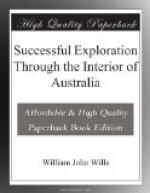In collateral evidence of what I have just said, I may instance the often-repeated injunction to accept things as little children; which cannot mean with the ignorance and helpless submission of infancy, but with minds free from bigotry, bias, or prejudice, like those of little children, and with an inclination, like them, to receive instruction. At what period of life do any of us learn so rapidly and eagerly as in childhood? We acquire new ideas every time we open our eyes; we are ever attracted by something we have not observed before; every moment adds to our knowledge. If you give a child something to eat it has not been accustomed to, does it swallow it at once without examination? Does it not rather look at, smell, feel, and then taste it? And if disagreeable, will it eat merely because the new food was given to it for that purpose? On the contrary, it is more inclined to reject the gift until influenced by your eating some yourself, or by other modes of persuasion. Let us then, in like manner, examine all that is offered to our belief, and test it by the faculties with which the great God has endowed us. These rare senses and powers of reasoning were given to be used freely, but not audaciously, to discover, not to pervert the truth. Why were so many things presented as through a veil, unless to stimulate our efforts to clear away the veil, and penetrate to the light? I think it is plain that St. Paul, while he calls upon us to believe, never intended that we should be passively credulous. [Footnote: My son might have further enforced his view by a passage from St. Paul, 1 Thessalonians, chapter 5 verse 21, had it occurred to him: “Prove all things; hold fast that which is good.” By this the apostle implies, according to Archbishop Secker’s commentary, all things which may be right or wrong according to conscience. And by “proving them” he means, not that we should try them by experience, which would be an absurd and pernicious direction, but that we should examine them by our faculty of judgment, which is a wise and useful exhortation.] Credulity was one of the most prominent engines of the Romish Church, but there was a trace of sense in their application of it. They taught that the ignorant and uneducated should have faith in the doctrines introduced to them by their betters, and those who had found time to investigate the matter; but some, in the present day, support the monstrous delusion that enlightened and well-trained intellects, the most glorious of all the earthly gifts of God, should bow to canting and illiterate fanaticism. . .
Adieu for the present, my dear mother, and believe me ever your affectionate, and I hope unbigoted son,
W.J. Wills.
. . .




